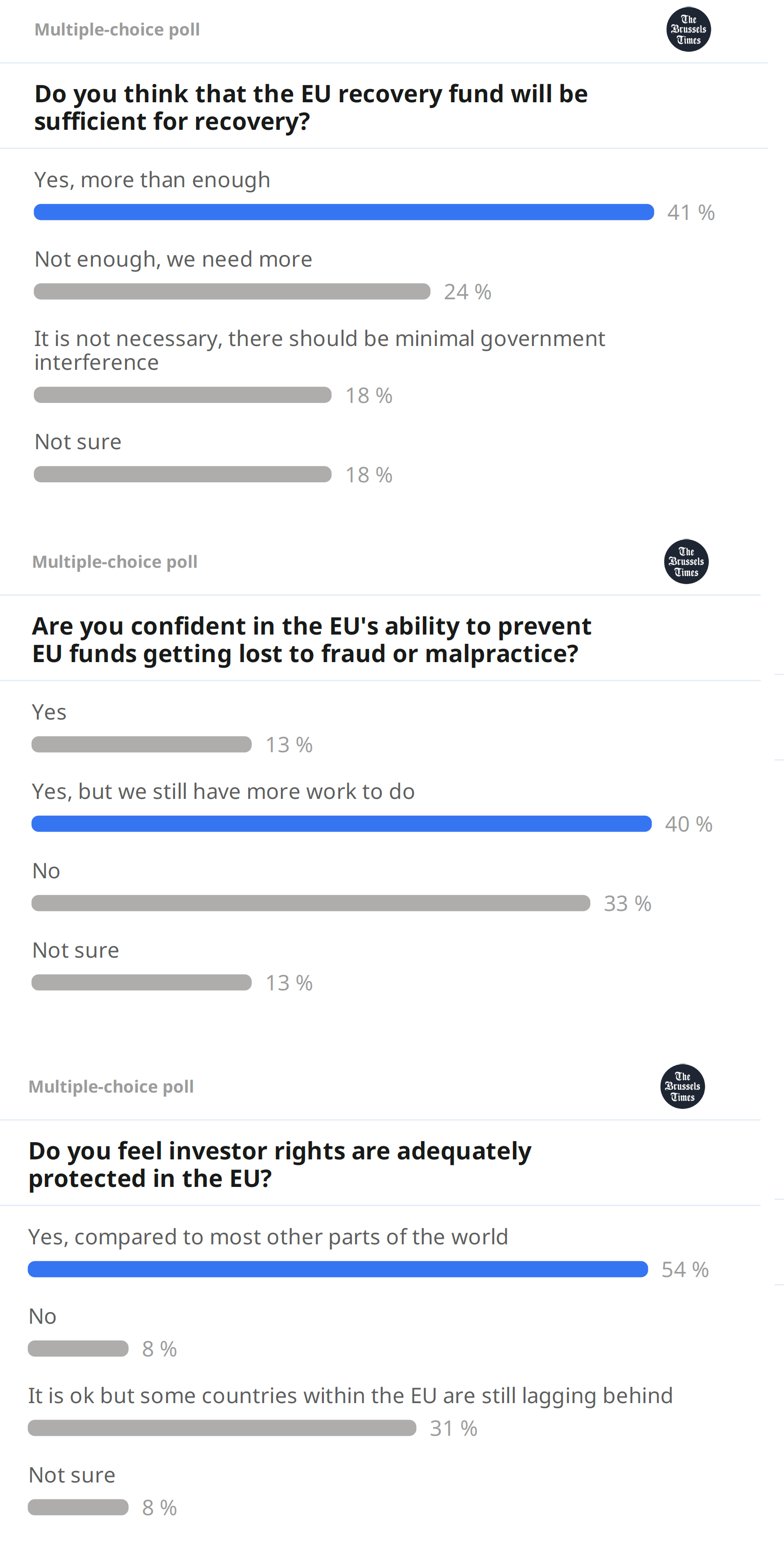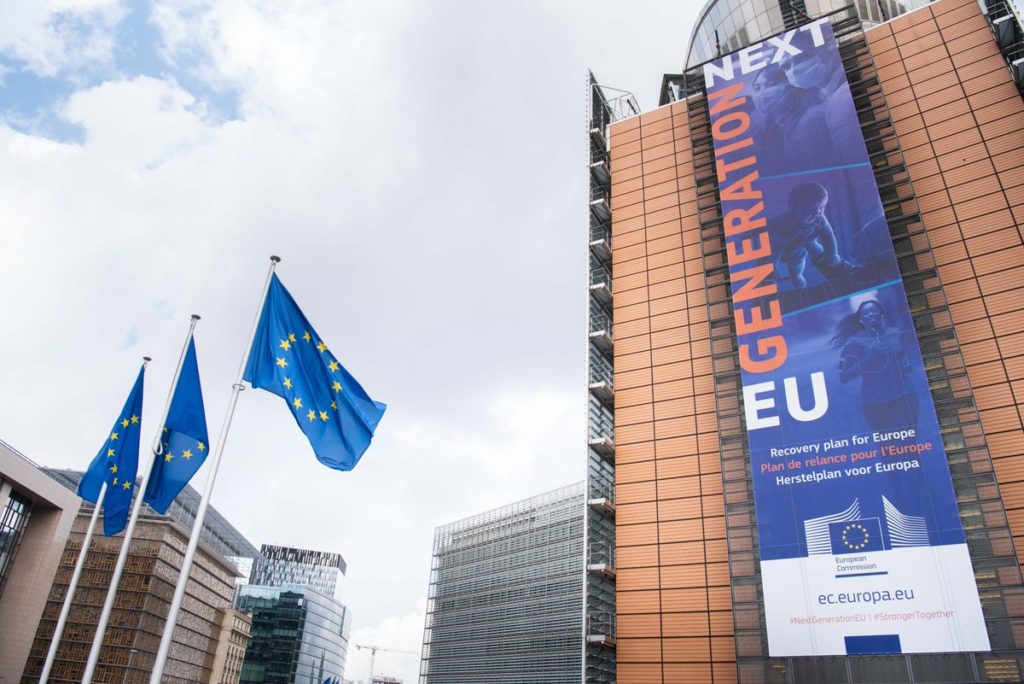The EU has been urged to take urgent action to speed up the process for settling judicial issues that can take up to a decade to resolve in some member states.
This was one of the messages to emerge from an online debate about the EU’s coronavirus recovery fund. The event is timely as the recovery plans are now being approved for each member state.
The debate focused on the huge €750bn recovery package but also addressed current problems facing investors in Europe and how their plight underlines the need to uphold the rule of law.
One such case cited involves “Recover Portugal” which represents a group of institutional investors holding Novo Banco bonds. Its members invested in the reform and recovery of the Portuguese economy and are taking action against the illegal retransfer of Novo Banco notes in 2015 to another entity holding toxic assets.
The case, it was argued, calls into question the entire credibility of the EU project.
Dr NoelleAnne O’Sullivan, Director of Communications and Public Affairs at Recover Portugal, said the group represents investors who lost some €2.2bn in Portugal.
She told the audience that the case illustrates the need for “simple and reliable” rules and also the effective enforcement of such rules in the event of a dispute.
“Investors generally need more certainty, an independent judiciary and timely expeditious of court cases: in other words, respect for the rule of law. If there is no effective enforcement there are no property rights and no protection of investments.”
She further explained that members of Recover Portugal were “deliberately and specifically targeted” because they were foreign and international investors, and not domestic investors.”
The case, she said, links in directly with the current question of whether EU governments will be able to pay back their debts under the recovery package.
“The problem is compounded by the fact that the Portuguese courts have stalled on taking action in our case since 2014. This should serve as a warning to other institutional investors that some countries do not respect the rule of law.
“Our investors bought bonds in Portugal but this money was never given back to them. Yes, we can praise the €750bn package but more surety is needed for such investors and also for potential investors in the future.”
This should also be of direct interest to the EU, she said.
“The EU is the guardian of the treaties and has a responsibility to enforce the rule of law in these countries. Only today, EU ministers are debating Article 7 procedures against Hungary and Poland.
“The EU has got the tools to address breaches of the rule of law but, like the Portuguese courts, it too takes a very long time over this. The problem is that investors need confidence in legal systems. This is something the EU needs to address.”
EU responsibilities
Portuguese MEP Nuno Melo said he had tabled a question to the European Commission asking for an explanation regarding the Recover Portugal case.
“It is not easy to understand how it came about but it is not right and nor is it right for the courts there to take so long, up to 10 years, to resolve conflicts. This is not fast enough.
“Also, the Portugal Central Bank did nothing to help these investors, and the governor of the bank at the time, who failed to resolve the dispute, was later made Vice President of the European Central Bank. He failed these investors but was promoted.”
The MEP said, “Portugal is one of the first countries to get a piece of the recovery pie, about €16bn, and it will soon have access to a very considerable sum of money. This is a lifeline to the Portuguese economy, post the crisis, and a unique opportunity to enable the country to implement some very crucial reforms so that if can, in the future, have a more business friendly environment.”
“Portugal should focus on this issue because it is still lagging behind. Yes, this money is good news but there are risks.”
After member states agreed the €750bn deal to finance the bloc’s recovery through commonly issued EU debt last year, broader questions have since emerged as to how the EU will effectively implement a fair, transparent and secure investment plan for recovery.
Several speakers at the event agreed that of particular importance is the Commission’s readiness to enforce the rule-of-law conditionality mechanism, designed to ensure that EU finds are not misused by EU governments for means that may result in an abuse of the rule of law. The mechanism has been in force since the start of the year.
Because of the unprecedented size of the funding, the RRF will pose significant new challenges to the EU and member states in terms of oversight and fraud prevention.
MEP Melo emphasised that ensuring a safe, transparent and fraudulent free investment environment will be essential to attract both domestic and foreign investors, retail and institutional investors alike, many of whom have suffered from misconduct throughout the various financial crises experienced over the past two decades.

Results from audience live-polls during the event
Martin Bresson, Public Affairs Director at Invest Europe, said, “There are two crucial issues and one is about this recovery fund money being well spent. Having a large amount of public money put to member states is needed after a health crisis and it all sounds great but, as always, the devil is in the detail. There a risk we will be supporting industries that may have fallen apart anyway.
Another speaker, Andrea Bordoni, of OLAF, the anti fraud agency for the EU, said, that tackling fraud against EU funds is “never an easy task” and an estimated 2 per cent of cohesion policy money is misspent.
“The commission has been taking action to tighten the control systems, including the start of the European Public Prosecutor which will be a game changer. This is because the post will help us to tackle fraud and, in particular, will address the cross border aspects of fraud, which is currently the weakest part of the control chain.”
“I agree that there are some countries, not just Portugal, where the judiciary takes ages to resolve court cases. My own country, Italy, is another example.”
Further comment came from Annemie Turtelboom, a member of the European Court of Auditors member and former Minister of Migration, Home Affairs and Justice in Belgium, who said, “One aim of the recovery plan is also to bridge the gaps that still exist between member states. But this money must be well spent and I agree that there needs to be a simplification of the rules relating to these new EU funds.”
The audience heard that the rule-of-law conditionality mechanism is a new tool designed to protect EU funds from being misused by EU governments who are found to have failed to respect the principle of the rule of law.
The application of the Rule of Law Conditionality Mechanism, which is Union law since the beginning of the year, is, it was said, “long overdue.”
The hour long webinar, organised by The Brussels Times with the support of Recover Portugal, concluded with all agreeing that the recovery funds must be used and implemented in a transparent and responsible way so that investor rights are fully protected at all times.
The Brussels Times

